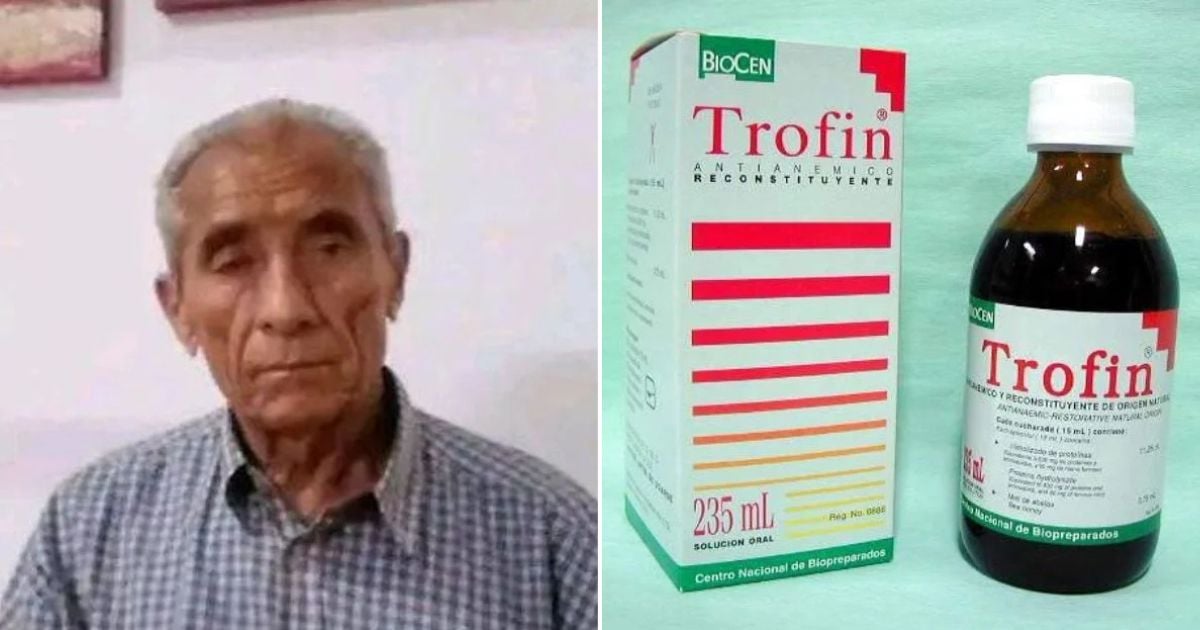
The daughter of Dr. Raúl González Hernández, creator of the renowned Cuban medication Trofin, raised her voice this Sunday to demand the recognition her father deserves, the scientist who conceived and developed the product in the 1990s, which is widely used in the country as an anti-anemic treatment.
Elizabeth González Aznar stated on Facebook that her father, despite being the main architect of Trofin, is not listed as the owner or creator of the medication due to the policies governing intellectual property in Cuba, where scientific works are legally owned by institutions rather than individuals.
El Trofin, registered as a medication in 1992 and patented two years later, has made a significant contribution to healthcare in Cuba. However, its creator, after retiring, has faced the humiliating necessity of begging for a few bottles of the product when he has needed it for his family, despite being the architect of its development.
According to González, the current system in Cuba does not allow researchers to register their discoveries as individuals, limiting their recognition to the role of "author or principal investigator" within an institution.
He believed that this legal framework has left many Cuban scientists in anonymity, including those whose developments have had a significant impact, such as his own father.
"My father dedicated years of effort and sacrifice to creating the Trofin, but his name does not appear as the owner of the product. In Cuba, scientists do not have the right to personal intellectual property. Everything is registered under the names of institutions, which renders the true creators invisible," his daughter reported.
The situation you describe affects not only your father but also other researchers in the country. While in many parts of the world, scientists are recognized as the intellectual owners of their works, in Cuba, the state structure prioritizes institutions, relegating creators to a secondary role.
The scientist's daughter emphasized the importance of valuing the people behind advancements: “Cuban scientists have significantly contributed to the country’s development, but often they work in anonymity, without receiving the recognition or rights they deserve for their achievements.”
With this statement, it seeks to highlight the need to shift the focus towards the creators of scientific products in Cuba, promoting a culture of recognition that values their individual efforts and their impact on society.
"I will defend my father and all the oppressed scientists, because their work not only changed lives, but also deserves to be recognized as such," he concluded.
Frequently Asked Questions about Dr. Raúl González Hernández and Scientific Recognition in Cuba
Who is Dr. Raúl González Hernández?
Dr. Raúl González Hernández is a prominent Cuban scientist known for creating the anti-anemic medication Trofin. Despite his significant contributions to public health in Cuba, he faces challenges in gaining official recognition due to intellectual property policies in the country.
What is Trofin and what is its importance in Cuba?
Trofin is an anti-anemic medication developed by Dr. Raúl González Hernández in the 1990s. It is widely used in Cuba to treat anemia, particularly in patients who cannot tolerate conventional treatments, and has had a significant impact on the health of many Cubans.
Why is Dr. González Hernández not recognized as the creator of Trofin?
In Cuba, intellectual property policies do not allow scientists to be individually recognized as owners of their discoveries. Instead, scientific works are registered in the name of the institutions, leaving the true creators anonymous.
What problems does Dr. González face in accessing the Trofin?
Dr. González Hernández faces difficulties in obtaining Trofin, the medication he developed himself, due to shortages and a lack of priority for access after his retirement. This situation reflects the lack of institutional support and recognition for his scientific legacy.
How does the lack of recognition affect scientists in Cuba?
The lack of individual recognition impacts both access to benefits and the personal dignity of scientists in Cuba. The state structure prioritizes institutions over individuals, rendering their contributions invisible and leaving many without the respect and acknowledgment they deserve for their achievements.
Filed under: